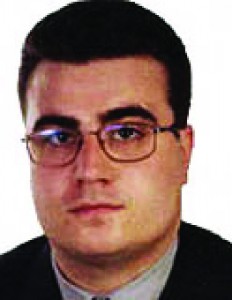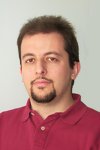MASCOTS 2014 features two tutorials, surveying the state-of-the-art in contemporary topics:
- Azzedine Boukerche, Amir Darehshoorzadeh: Opportunistic Routing in Wireless Multi-hop Networks.
- Fabrizio Granelli, Marco Di Renzo: Energy Efficiency in Wireless Networks.
Registration : Please click here and follow the instructions for the registration.
______________________________
Opportunistic Routing in Wireless Multi-hop Networks
Azzedine Boukerche and Amir Darehshoorzadeh
 Abstract: Opportunistic Routing (OR) is a new promising paradigm, which has been proposed as a way to increase the performance of wireless networks by exploiting its broadcast nature. It benefits from the broadcast characteristic of wireless mediums to improve the network performance. In OR, instead of pre-selecting a single specific node to be the next-hop as a forwarder for a packet, multiple nodes can potentially be selected as the next-hop forwarder. Hence, each node in OR can use different potential paths to send packets toward the destination. More specially, when the current node transmits a packet, all the candidates that receive the packet successfully will coordinate with each other to determine which one would actually forward the packet according to some criteria, while the other nodes will simply discard it.
Abstract: Opportunistic Routing (OR) is a new promising paradigm, which has been proposed as a way to increase the performance of wireless networks by exploiting its broadcast nature. It benefits from the broadcast characteristic of wireless mediums to improve the network performance. In OR, instead of pre-selecting a single specific node to be the next-hop as a forwarder for a packet, multiple nodes can potentially be selected as the next-hop forwarder. Hence, each node in OR can use different potential paths to send packets toward the destination. More specially, when the current node transmits a packet, all the candidates that receive the packet successfully will coordinate with each other to determine which one would actually forward the packet according to some criteria, while the other nodes will simply discard it.
The proposed tutorial is intended to offer a comprehensive state-of-the-art survey on OR research. We will explain the fundamental idea of OR and its important issues by providing some examples. We will then categorize each of the important issues and explain them in detail. We will explain different OR metrics in addition to the different way of candidate selection using some example. Furthermore, we will illustrate different protocols from each category and compare their benefits and drawbacks. The tutorial will be continued by describing some important analytical aspects in OR with emphasizing on the performance analysis of OR using a Discrete Time Markov Chain (DTMC) paradigm. During the tutorial we will use some simulation and numerical results to support different ideas and aspects of OR. Finally, tutorial will be concluded with a comprehensive review of open research challenges and some potential directions for future research in OR, thus making the material presented in this tutorial useful for researchers and academics.
Presenters
Prof. Azzedine Boukerche, FEiC, FCAE, FAAAS, is a Professor at the University of Ottawa where he also holds a Canada Research Chair Tier 1. He has served as General Chair and TPC Chair of several IEEE and ACM sponsored Conferences including MASCOTS. He also serves as Associate Editor of several IEEE and ACM journals. His areas on interests are Large-Scale Distributed Simulation, Wireless Networking, Ad Hoc and Sensor networks and Intelligent Transportation Systems.
Dr. Amir Darehshoorzadeh is a Research Scientist at the PARADISE Lab at University of Ottawa. He received his Ph.D. in 2012 with cum laude from the Technical University of Catalonia (UPC), Barcelona, Spain. He received his his M.Sc Degree from Iran University of Science and Technology (IUST), Tehran, Iran in 2006. His main current research areas are Opportunistic Routing, Modeling and Network optimization, Wireless Networks including VANETs, MANETs, WSNs, Multicast protocols and QoS provision. In these areas he has extensively published research papers in international conferences and journals and giave several lecture in the same areas.
______________________________
Energy Efficiency in Wireless Networks
Fabrizio Granelli and Marco Di Renzo
Abstract: With the increasing growth of wireless access to the Internet and its services, wireless networks represent a key communication infrastructure for ubiquitous connectivity. The need to support exponential growth in data traffic as wellas availability of several mobile devices (smartphones, tablets, etc.) is leading to a sharp increase in the number of base station devices and in their complexity, leading to a consequent increase in power usage and consumption. Indeed, high power consumption can represent a limiting factor for the scalability of next generation wireless networks.
The tutorial will first present an overview of power consumption in wireless networks, aimed at identifying the major sources of power consumption and to define proper benchmarks for performance evaluation. Based on such analysis, different architectural and technological solutions will be proposed in order to reduce or optimize energy consumption in wireless networks. Based on the reference heterogeneous scenario of coexisting 3G LTE macro/pico/femto base stations, relay terminals, WiFi WLANs, etc. the tutorial will survey the relevant solutions at the PHY, MAC and network level, as well as advanced paradigms related to cooperation, network coding and cognition. All major solutions will be analyzed and compared by offering the unique vision provided by the EU funded GREENET project, with detailed simulations as well as real testbed experiments.
Presenters
Fabrizio Granelli is IEEE ComSoc Distinguished Lecturer for 2012-13, and Associate Professor at the Dept. of Information Engineering and Computer Science (DISI) of the University of Trento (Italy). From 2008, he is deputy head of the academic council in Information Engineering. He received the «Laurea» (M.Sc.) degree in Electronic Engineering and the Ph.D. in Telecommunications Engineering from the University of Genoa, Italy, in 1997 and 2001, respectively. In August 2004 and August 2010, he was visiting professor at the State University of Campinas (Brasil). He is author or co-author of more than 130 papers with topics related to networking, with focus on performance modeling, wireless communications and networks, cognitive radios and networks, green networking and smart grid communications. Dr. Granelli was guest-editor of ACM Journal on Mobile Networks and Applications, ACM Transactions on Modeling and Computer Simulation, and Hindawi Journal of Computer Systems, Networks and Communications. He was General Chair of the 11th and 15th IEEE Workshop on Computer-Aided Modeling, Analysis, and Design of Communication Links and Networks (CAMAD’06 and IEEE CAMAD’10). He is TPC Co-Chair of IEEE GLOBECOM Symposium on “Communications QoS, Reliability and Performance Modeling” in the years 2007, 2008, 2009 and 2012. He was officer (Secretary 2005-2006, Vice-Chair 2007-2008, Chair 2009-2010) of the IEEE ComSoc Technical Committee on Communication Systems Integration and Modeling (CSIM), and Associate Editor of IEEE Communications Letters (2007-2011).
Marco Di Renzo (S’05-AM’07-M’09-SM’14) received the Laurea (cum laude) and the Ph.D. degrees in Electrical and Information Engineering from the Department of Electrical and Information Engineering, University of L’Aquila, Italy, in April 2003 and in January 2007. In October 2013, he received the Habilitation à Diriger des Recherches (HDR) from the University of Paris-Sud XI, Paris, France.
Since January 2010, he has been a Tenured Academic Researcher (Chargé de Recherche Titulaire) with the French National Center for Scientific Research (CNRS), as well as a faculty member of the Laboratory of Signals and Systems (L2S), a joint research laboratory of the CNRS, the Ecole Supérieure d’Electricité (SUPELEC) and the University of Paris-Sud XI, Paris, France. His main research interests are in the area of wireless communications theory.
Dr. Di Renzo is a recipient of several awards, which include a special mention for the outstanding five-year (1997-2003) academic career, University of L’Aquila, Italy; the THALES Communications fellowship (2003-2006), University of L’Aquila, Italy; the 2004 Best Spin-Off Company Award, Abruzzo Region, Italy; the 2006 DEWS Travel Grant Award, University of L’Aquila, Italy; the 2008 Torres Quevedo Award, Ministry of Science and Innovation, Spain; the “Dérogation pour l’Encadrement de Thèse”(2010), University of Paris-Sud XI, France; the 2012 IEEE CAMAD Best Paper Award; the 2012 IEEE WIRELESS COMMUNICATIONS LETTERS Exemplary Reviewer Award; the 2013 IEEE VTC-Fall Best Student Paper Award; the 2013 Network of Excellence NEWCOM\# Best Paper Award; the 2013 IEEE TRANSACTIONS ON VEHICULAR TECHNOLOGY Top Reviewer Award; the 2013 IEEE-COMSOC Best Young Researcher Award for Europe, Middle East and Africa (EMEA Region); and the 2014 IEEE ICNC Single Best Paper Award Nomination (Wireless Communications Symposium). Currently, he serves as an Editor of the IEEE COMMUNICATIONS LETTERS and of the IEEE TRANSACTIONS ON COMMUNICATIONS (Heterogeneous Networks Modeling and Analysis).
______________________________


